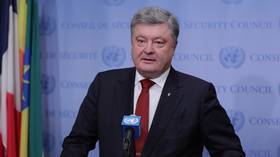EU destroying its industries by shunning Russian energy, official tells RT

The EU’s industrial sector is suffering from the consequences of last year’s ban on Russian coal, Russian Deputy Energy Minister Sergey Mochalnikov told RT on the sidelines of the Eastern Economic Forum (EEF) on Monday.
According to the official, Russia’s coal producers have successfully fended off the challenges posed by the embargo, redirecting most of the supplies to the Global South and Asia-Pacific. However, the bloc has been forced to seek alternative coal sources and has dealt with quality issues despite substituting most Russian suppliers.
“The EU is behaving strangely. They are systematically destroying their industry by rejecting Russian energy, including gas, oil, and coal. Although, according to last year’s results, we saw an increase in their coal consumption, without Russian raw materials, it is harder for them because their production was geared to the quality of Russian coal. Now, buying coal in Africa, Latin America, and Asia, they lose on quality and have to readjust their technological processes,” Mochalnikov explained.
The deputy minister noted that the majority of this Russian coal, which had to be redirected following the EU ban, went to China and India. Both countries significantly boosted their purchases of the commodity, with China importing 67 million tons from Russia in 2022 compared to a little over 50 million in 2021. India imported more than 20 million tons last year, nearly tripling purchases from 2021.
“We’ve managed to successfully reorient our markets by turning to the east,” he stated.
Mochalnikov noted that while sanctions did affect Russia’s energy industry, it has been steadily recovering over the past year.
“Any abrupt changes have a negative impact on the financial component – companies had to look for new partners, new logistics routes, had to face longer delivery times, and were forced to take a different approach to insurance, as sanctions did not just target coal but also services related to its exports. However, the companies are doing well, and while the financial results are behind those of last year, we expect the coal industry to end 2023 in good shape,” he concluded.
The EU embargo on imports of Russian coal was part of the bloc's fifth package of Ukraine-related sanctions against Moscow. The measure came into force in August 2022. Before the ban, the bloc depended on Russia for around 45% of its coal imports, according to data from the European Commission. The EU’s industrial leader, Germany, as well as Poland and the Netherlands, were among the largest purchasers.
For more stories on economy & finance visit RT's business section













